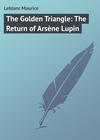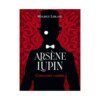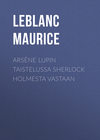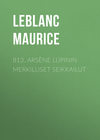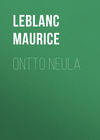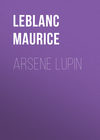Kitabı oku: «The Golden Triangle: The Return of Arsène Lupin», sayfa 12
But the father answered the son with nothing but more words of challenge and despair:
"Who can rescue us? We are walled up in this tomb, buried alive and condemned to torture without being able to defend ourselves. My revolver lies there, upon the table. What is the use of it? The enemy does not attack us. He has time on his side, unrelenting time which kills of its own strength, by the mere fact that it is time. Who can rescue us? Who will save my darling Coralie?"
The position was terrible, and they felt all its tragic horror. It seemed to them as though they were already dead, once they were enduring the same trial endured by others and that they were still enduring it under the same conditions. There was nothing to enable them to escape any of the phases through which the other two, his father and her mother, had passed. The similarity between their own and their parents' fate was so striking that they seemed to be suffering two deaths, and the second agony was now commencing.
Coralie gave way and began to cry. Moved by her tears, Patrice attacked the wainscoting with new fury, but its boards, strengthened by cross-laths, resisted his efforts:
At last he read:
"What is happening? We had an impression that some one was walking outside, in the garden. Yes, when we put our ears to the stone wall built in the embrasure of the window, we thought we heard footsteps. Is it possible? Oh, if it only were! It would mean the struggle, at last. Anything rather than the maddening silence and endless uncertainty!
"That's it!.. That's it!.. The sound is becoming more distinct… It is a different sound, like that which you make when you dig the ground with a pick-ax. Some one is digging the ground, not in front of the house, but on the right, near the kitchen.."
Patrice redoubled his efforts. Coralie came and helped him. This time he felt that a corner of the veil was being lifted. The writing went on:
"Another hour, with alternate spells of sound and silence: the same sound of digging and the same silence which suggests work that is being continued.
"And then some one entered the hall, one person; he, evidently. We recognized his step… He walks without attempting to deaden it… Then he went to the kitchen, where he worked the same way as before, with a pick-ax, but on the stones this time. We also heard the noise of a pane of glass breaking.
"And now he has gone outside again and there is a new sort of sound, against the house, a sound that seems to travel up the house as though the wretch had to climb to a height in order to carry out his plan.."
Patrice stopped reading and looked at Coralie. Both of them were listening.
"Hark!" he said, in a low voice.
"Yes, yes," she answered, "I hear… Steps outside the house.. in the garden.."
They went to one of the windows, where they had left the casement open behind the wall of building-stones, and listened. There was really some one walking; and the knowledge that the enemy was approaching gave them the same sense of relief that their parents had experienced.
Some one walked thrice round the house. But they did not, like their parents, recognize the sound of the footsteps. They were those of a stranger, or else steps that had changed their tread. Then, for a few minutes, they heard nothing more. And suddenly another sound arose; and, though in their innermost selves they were expecting it, they were nevertheless stupefied at hearing it. And Patrice, in a hollow voice, laying stress upon each syllable, uttered the sentence which his father had written twenty years before:
"It's the sound which you make when you dig the ground with a pick-ax."
Yes, It must be that. Some one was digging the ground, not in front of the house, but on the right, near the kitchen.
And so the abominable miracle of the revived tragedy was continuing. Here again the former act was repeated, a simple enough act in itself, but one which became sinister because it was one of those which had already been performed and because it was announcing and preparing the death once before announced and prepared.
An hour passed. The work went on, paused and went on again. It was like the sound of a spade at work in a courtyard, when the grave-digger is in no hurry and takes a rest and then resumes his work.
Patrice and Coralie stood listening side by side, their eyes in each other's eyes, their hands in each other's hands.
"He's stopping," whispered Patrice.
"Yes," said Coralie; "only I think."
"Yes, Coralie, there's some one in the hall… Oh, we need not trouble to listen! We have only to remember. There: 'He goes to the kitchen and digs as he did just now, but on the stones this time.'.. And then.. and then.. oh, Coralie, the same sound of broken glass!"
It was memories mingling with the grewsome reality. The present and the past formed but one. They foresaw events at the very instant when these took place.
The enemy went outside again; and, forthwith, the sound seemed "to travel up the house as though the wretch had to climb to a height in order to carry out his plans."
And then.. and then what would happen next? They no longer thought of consulting the inscription on the wall, or perhaps they did not dare. Their attention was concentrated on the invisible and sometimes imperceptible deeds that were being accomplished against them outside, an uninterrupted stealthy effort, a mysterious twenty-year-old plan whereof each slightest detail was settled as by clockwork!
The enemy entered the house and they heard a rustling at the bottom of the door, a rustling of soft things apparently being heaped or pushed against the wood. Next came other vague noises in the two adjoining rooms, against the walled doors, and similar noises outside, between the stones of the windows and the open shutters. And then they heard some one on the roof.
They raised their eyes. This time they felt certain that the last act was at hand, or at least one of the scenes of the last act. The roof to them was the framed skylight which occupied the center of the ceiling and admitted the only daylight that entered the room. And still the same agonizing question rose to their minds: what was going to happen? Would the enemy show his face outside the skylight and reveal himself at last?
This work on the roof continued for a considerable time. Footsteps shook the zinc sheets that covered it, moving between the right-hand side of the house and the edge of the skylight. And suddenly this skylight, or rather a part of it, a square containing four panes, was lifted, a very little way, by a hand which inserted a stick to keep it open.
And the enemy again walked across the roof and went down the side of the house.
They were almost disappointed and felt such a craving to know the truth that Patrice once more fell to breaking the boards of the wainscoting, removing the last pieces, which covered the end of the inscription. And what they read made them live the last few minutes all over again. The enemy's return, the rustle against the walls and the walled windows, the noise on the roof, the opening of the skylight, the method of supporting it: all this had happened in the same order and, so to speak, within the same limit of time. Patrice's father and Coralie's mother had undergone the same impressions. Destiny seemed bent on following the same paths and making the same movements in seeking the same object.
And the writing went on:
"He is going up again, he is going up again… There's his footsteps on the roof… He is near the skylight… Will he look through?.. Shall we see his hated face?."
"He is going up again, he is going up again," gasped Coralie, nestling against Patrice.
The enemy's footsteps were pounding over the zinc.
"Yes," said Patrice, "he is going up as before, without departing from the procedure followed by the other. Only we do not know whose face will appear to us. Our parents knew their enemy."
She shuddered at her image of the man who had killed her mother; and she asked:
"It was he, was it not?"
"Yes, it was he. There is his name, written by my father."
Patrice had almost entirely uncovered the inscription. Bending low, he pointed with his finger:
"Look. Read the name: Essarès. You can see it down there: it was one of the last words my father wrote."
And Coralie read:
"The skylight rose higher, a hand lifted it and we saw.. we saw, laughing as he looked down on us – oh, the scoundrel – Essarès!.. Essarès!.. And then he passed something through the opening, something that came down, that unrolled itself in the middle of the room, over our heads: a ladder, a rope-ladder.
"We did not understand. It was swinging in front of us. And then, in the end, I saw a sheet of paper rolled round the bottom rung and pinned to it. On the paper, in Essarès' handwriting, are the words, 'Send Coralie up by herself. Her life shall be saved. I give her ten minutes to accept. If not.'"
"Ah," said Patrice, rising from his stooping posture, "will this also be repeated? What about the ladder, the rope-ladder, which I found in old Siméon's cupboard?"
Coralie kept her eyes fixed on the skylight, for the footsteps were moving around it. Then they stopped. Patrice and Coralie had not a doubt that the moment had come and that they also were about to see their enemy. And Patrice said huskily, in a choking voice:
"Who will it be? There are three men who could have played this sinister part as it was played before. Two are dead, Essarès and my father. And Siméon, the third, is mad. Is it he, in his madness, who has set the machine working again? But how are we to imagine that he could have done it with such precision? No, no, it is the other one, the one who directs him and who till now has remained in the background."
He felt Coralie's fingers clutching his arm.
"Hush," she said, "here he is!"
"No, no."
"Yes, I'm sure of it."
Her imagination had foretold what was preparing; and in fact, as once before, the skylight was raised higher. A hand lifted it. And suddenly they saw a head slipping under the open framework.
It was the head of old Siméon.
"The madman!" Patrice whispered, in dismay. "The madman!"
"But perhaps he isn't mad," she said. "He can't be mad."
She could not check the trembling that shook her.
The man overhead looked down upon them, hidden behind his spectacles, which allowed no expression of satisfied hatred or joy to show on his impassive features.
"Coralie," said Patrice, in a low voice, "do what I say… Come.."
He pushed her gently along, as though he were supporting her and leading her to a chair. In reality he had but one thought, to reach the table on which he had placed his revolvers, take one of them and fire.
Siméon remained motionless, like some evil genius come to unloose the tempest… Coralie could not rid herself of that glance which weighted upon her.
"No," she murmured, resisting Patrice, as though she feared that his intention would precipitate the dreaded catastrophe, "no, you mustn't.."
But Patrice, displaying greater determination, was near his object. One more effort and his hand would hold the revolver.
He quickly made up his mind, took rapid aim and fired a shot.
The head disappeared from sight.
"Oh," said Coralie, "you were wrong, Patrice! He will take his revenge on us.."
"No, perhaps not," said Patrice, still holding his revolver. "I may very well have hit him. The bullet struck the frame of the skylight. But it may have glanced off, in which case."
They waited hand in hand, with a gleam of hope, which did not last long, however.
The noise on the roof began again. And then, as before – and this they really had the impression of not seeing for the first time – as before, something passed through the opening, something that came down, that unrolled itself in the middle of the room, a ladder, a rope-ladder, the very one which Patrice had seen in old Siméon's cupboard.
As before, they looked at it; and they knew so well that everything was being done over again, that the facts were inexorably, pitilessly linked together, they were so certain of it that their eyes at once sought the sheet of paper which must inevitably be pinned to the bottom rung.
"Send Coralie up by herself. Her life shall be saved. I give her ten minutes to accept. If not."
CHAPTER XIII
THE NAILS IN THE COFFIN
"If not."
Patrice repeated the words mechanically, several times over, while their formidable significance became apparent to both him and Coralie. The words meant that, if Coralie did not obey and did not deliver herself to the enemy, if she did not flee from prison to go with the man who held the keys of the prison, the alternative was death.
At that moment neither of them was thinking what end was in store for them nor even of that death itself. They thought only of the command to separate which the enemy had issued against them. One was to go and the other to die.
Coralie was promised her life if she would sacrifice Patrice. But what was the price of the promise? And what would be the form of the sacrifice demanded?
There was a long silence, full of uncertainty and anguish between the two lovers. They were coming to grips with something; and the drama was no longer taking place absolutely outside them, without their playing any other part than that of helpless victims. It was being enacted within themselves; and they had the power to alter its ending. It was a terrible problem. It had already been set to the earlier Coralie; and she had solved it as a lover would, for she was dead. And now it was being set again.
Patrice read the inscription; and the rapidly scrawled words became less distinct:
"I have begged and entreated Coralie… She flung herself on her knees before me. She wants to die with me.."
Patrice looked at Coralie. He had read the words in a very low voice; and she had not heard them. Then, in a burst of passion, he drew her eagerly to him and exclaimed:
"You must go, Coralie! You can understand that my not saying so at once was not due to hesitation. No, only.. I was thinking of that man's offer.. and I am frightened for your sake… What he asks, Coralie, is terrible. His reason for promising to save your life is that he loves you. And so you understand… But still, Coralie, you must obey.. you must go on living… Go! It is no use waiting for the ten minutes to pass. He might change his mind and condemn you to death as well. No, Coralie, you must go, you must go at once!"
"I shall stay," she replied, simply.
He gave a start:
"But this is madness! Why make a useless sacrifice? Are you afraid of what might happen if you obeyed him?"
"No."
"Then go."
"I shall stay."
"But why? Why this obstinacy? It can do no good. Then why stay?"
"Because I love you, Patrice."
He stood dumfounded. He knew that she loved him and he had already told her so. But that she loved him to the extent of preferring to die in his company, this was an unexpected, exquisite and at the same time terrible delight.
"Ah," he said, "you love me, Coralie! You love me!"
"I love you, my own Patrice."
She put her arms around his neck; and he felt that hers was an embrace too strong to be sundered. Nevertheless, he was resolved to save her; and he refused to yield:
"If you love me," he said, "you must obey me and save your life. Believe me, it is a hundred times more painful for me to die with you than to die alone. If I know that you are free and alive, death will be sweet to me."
She did not listen and continued her confession, happy in making it, happy in uttering words which she had kept to herself so long:
"I have loved you, Patrice, from the first day I saw you. I knew it without your telling me; and my only reason for not telling you earlier was that I was waiting for a solemn occasion, for a time when it would be a glory to tell you so, while I looked into the depths of your eyes and offered myself to you entirely. As I have had to speak on the brink of the grave, listen to me and do not force upon me a separation which would be worse than death."
"No, no," he said, striving to release himself, "it is your duty to go."
He made another effort and caught hold of her hands:
"It is your duty to go," he whispered, "and, when you are free, to do all that you can to save me."
"What are you saying, Patrice?"
"Yes," he repeated, "to save me. There is no reason why you should not escape from that scoundrel's clutches, report him, seek assistance, warn our friends. You can call out, you can play some trick.."
She looked at him with so sad a smile and such a doubting expression that he stopped speaking.
"You are trying to mislead me, my poor darling," she said, "but you are no more taken in by what you say than I am. No, Patrice, you well know that, if I surrender myself to that man, he will reduce me to silence or imprison me in some hiding-place, bound hand and foot, until you have drawn your last breath."
"You really think that?"
"Just as you do, Patrice. Just as you are sure of what will happen afterwards."
"Well, what will happen?"
"Ah, Patrice, if that man saves my life, it will not be out of generosity. Don't you see what his plan is, his abominable plan, once I am his prisoner? And don't you also see what my only means of escape will be? Therefore, Patrice, if I am to die in a few hours, why not die now, in your arms.. at the same time as yourself, with my lips to yours? Is that dying? Is it not rather living, in one instant, the most wonderful of lives?"
He resisted her embrace. He knew that the first kiss of her proffered lips would deprive him of all his power of will.
"This is terrible," he muttered. "How can you expect me to accept your sacrifice, you, so young, with years of happiness before you?"
"Years of mourning and despair, if you are gone."
"You must live, Coralie. I entreat you to, with all my soul."
"I cannot live without you, Patrice. You are my only happiness. I have no reason for existence except to love you. You have taught me to love. I love you!"
Oh, those heavenly words! For the second time they rang between the four walls of that room. The same words, spoken by the daughter, which the mother had spoken with the same passion and the same glad acceptance of her fate! The same words made twice holy by the recollection of death past and the thought of death to come!
Coralie uttered them without alarm. All her fears seemed to disappear in her love; and it was love alone that shook her voice and dimmed the brightness of her eyes.
Patrice contemplated her with a rapt look. He too was beginning to think that minutes such as these were worth dying for. Nevertheless, he made a last effort:
"And if I ordered you to go, Coralie?"
"That is to say," she murmured, "if you ordered me to go to that man and surrender myself to him? Is that what you wish, Patrice?"
The thought was too much for him.
"Oh, the horror of it! That man.. that man.. you, my Coralie, so stainless and undefiled!."
Neither he nor she pictured the man in the exact image of Siméon. To both of them, notwithstanding the hideous vision perceived above, the enemy retained a mysterious character. It was perhaps Siméon. It was perhaps another, of whom Siméon was but the instrument. Assuredly it was the enemy, the evil genius crouching above their heads, preparing their death-throes while he pursued Coralie with his foul desire.
Patrice asked one more question:
"Did you ever notice that Siméon sought your company?"
"No, never. If anything, he rather avoided me."
"Then it's because he's mad.."
"I don't think he is mad: he is revenging himself."
"Impossible. He was my father's friend. All his life long he worked to bring us together: surely he would not kill us deliberately?"
"I don't know, Patrice, I don't understand.."
They discussed it no further. It was of no importance whether their death was caused by this one or that one. It was death itself that they had to fight, without troubling who had set it loose against them. And what could they do to ward it off?
"You agree, do you not?" asked Coralie, in a low voice.
He made no answer.
"I shall not go," she went on, "but I want you to be of one mind with me. I entreat you. It tortures me to think that you are suffering more than I do. You must let me bear my share. Tell me that you agree."
"Yes," he said, "I agree."
"My own Patrice! Now give me your two hands, look right into my eyes and smile."
Mad with love and longing they plunged themselves for an instant into a sort of ecstasy. Then she asked:
"What is it, Patrice? You seem distraught again."
He gave a hoarse cry:
"Look!.. Look."
This time he was certain of what he had seen. The ladder was going up. The ten minutes were over.
He rushed forward and caught hold of one of the rungs. The ladder no longer moved.
He did not know exactly what he intended to do. The ladder afforded Coralie's only chance of safety. Could he abandon that hope and resign himself to the inevitable?
One or two minutes passed. The ladder must have been hooked fast again, for Patrice felt a firm resistance up above.
Coralie was entreating him:
"Patrice," she asked, "Patrice, what are you hoping for?"
He looked around and above him, as though seeking an idea, and he seemed also to look inside himself, as though he were seeking that idea amid all the memories which he had accumulated at the moment when his father also held the ladder, in a last effort of will. And suddenly, throwing up his leg, he placed his left foot on the fifth rung of the ladder and began to raise himself by the uprights.
It was an absurd attempt to scale the ladder, to reach the skylight, to lay hold of the enemy and thus save himself and Coralie. If his father had failed before him, how could he hope to succeed?
It was all over in less than three seconds. The ladder was at once unfastened from the hook that kept it hanging from the skylight; and Patrice and the ladder came to the ground together. At the same time a strident laugh rang out above, followed the next moment by the sound of the skylight closing.
Patrice picked himself up in a fury, hurled insults at the enemy and, as his rage increased, fired two revolver shots, which broke two of the panes. He next attacked the doors and windows, banging at them with the iron dog which he had taken from the fender. He hit the walls, he hit the floor, he shook his fist at the invisible enemy who was mocking him. But suddenly, after a few blows struck at space, he was compelled to stop. Something like a thick veil had glided overhead. They were in the dark.
He understood what had happened. The enemy had lowered a shutter upon the skylight, covering it entirely.
"Patrice! Patrice!" cried Coralie, maddened by the blotting out of the light and losing all her strength of mind. "Patrice! Where are you, Patrice? Oh, I'm frightened! Where are you?"
They began to grope for each other, like blind people, and nothing that had gone before seemed to them more horrible than to be lost in this pitiless blackness.
"Patrice! Oh, Patrice! Where are you?"
Their hands touched, Coralie's poor little frozen fingers and Patrice's hands that burned with fever, and they pressed each other and twined together and clutched each other as though to assure themselves that they were still living.
"Oh, don't leave me, Patrice!" Coralie implored.
"I am here," he replied. "Have no fear: they can't separate us."
"You are right," she panted, "they can't separate us. We are in our grave."
The word was so terrible and Coralie uttered it so mournfully that a reaction overtook Patrice.
"No! What are you talking about?" he exclaimed. "We must not despair. There is hope of safety until the last moment."
Releasing one of his hands, he took aim with his revolver. A few faint rays trickled through the chinks around the skylight. He fired three times. They heard the crack of the wood-work and the chuckle of the enemy. But the shutter must have been lined with metal, for no split appeared.
Besides, the chinks were forthwith stopped up; and they became aware that the enemy was engaged in the same work that he had performed around the doors and windows. It was obviously very thorough and took a long time in the doing. Next came another work, completing the first. The enemy was nailing the shutter to the frame of the skylight.
It was an awful sound! Swift and light as were the taps of the hammer, they seemed to drive deep into the brain of those who heard them. It was their coffin that was being nailed down, their great coffin with a lid hermetically sealed that now bore heavy upon them. There was no hope left, not a possible chance of escape. Each tap of the hammer strengthened their dark prison, making yet more impregnable the walls that stood between them and the outer world and bade defiance to the most resolute assault:
"Patrice," stammered Coralie, "I'm frightened.. That tapping hurts me so!".
She sank back in his arms. Patrice felt tears coursing down her cheeks.
Meanwhile the work overhead was being completed. They underwent the terrible experience which condemned men must feel on the morning of their last day, when from their cells they hear the preparations: the engine of death that is being set up, or the electric batteries that are being tested. They hear men striving to have everything ready, so that not one propitious chance may remain and so that destiny may be fulfilled. Death had entered the enemy's service and was working hand in hand with him. He was death itself, acting, contriving and fighting against those whom he had resolved to destroy.
"Don't leave me," sobbed Coralie, "don't leave me!."
"Only for a second or two," he said. "We must be avenged later."
"What is the use, Patrice? What can it matter to us?"
He had a box containing a few matches. Lighting them one after the other, he led Coralie to the panel with the inscription.
"What are you going to do?" she asked.
"I will not have our death put down to suicide. I want to do what our parents did before us and to prepare for the future. Some one will read what I am going to write and will avenge us."
He took a pencil from his pocket and bent down. There was a free space, right at the bottom of the panel. He wrote:
"Patrice Belval and Coralie, his betrothed, die the same death, murdered by Siméon Diodokis, 14 April, 1915."
But, as he finished writing, he noticed a few words of the former inscription which he had not yet read, because they were placed outside it, so to speak, and did not appear to form part of it.
"One more match," he said. "Did you see? There are some words there, the last, no doubt, that my father wrote."
She struck a match. By the flickering light they made out a certain number of misshapen letters, obviously written in a hurry and forming two words:
"Asphyxiated… Oxide.."
The match went out. They rose in silence. Asphyxiated! They understood. That was how their parents had perished and how they themselves would perish. But they did not yet fully realize how the thing would happen. The lack of air would never be great enough to suffocate them in this large room, which contained enough to last them for many days.
"Unless," muttered Patrice, "unless the quality of the air can be impaired and therefore."
He stopped. Then he went on:
"Yes, that's it. I remember."
He told Coralie what he suspected, or rather what conformed so well with the reality as to leave no room for doubt. He had seen in old Siméon's cupboard not only the rope-ladder which the madman had brought with him, but also a coil of lead pipes. And now Siméon's behavior from the moment when they were locked in, his movements to and fro around the lodge, the care with which he had stopped up every crevice, his labors along the wall and on the roof: all this was explained in the most definite fashion. Old Siméon had simply fitted to a gas-meter, probably in the kitchen, the pipe which he had next laid along the wall and on the roof. This therefore was the way in which they were about to die, as their parents had died before them, stifled by ordinary gas.
Panic-stricken, they began to run aimlessly about the room, holding hands, while their disordered brains, bereft of thought or will, seemed like tiny things shaken by the fiercest gale. Coralie uttered incoherent words. Patrice, while imploring her to keep calm, was himself carried away by the storm and powerless to resist the terrible agony of the darkness wherein death lay waiting. At such times a man tries to flee, to escape the icy breath that is already chilling his marrow. He must flee, but where? Which way? The walls are insurmountable and the darkness is even harder than the walls.
They stopped, exhausted. A low hiss was heard somewhere in the room, the faint hiss that issues from a badly-closed gas-jet. They listened and perceived that it came from above. The torture was beginning.
"It will last half an hour, or an hour at most," Patrice whispered.
Coralie had recovered her self-consciousness:
"We shall be brave," she said.
"Oh, if I were alone! But you, you, my poor Coralie!"
"It is painless," she murmured.
"You are bound to suffer, you, so weak!"
"One suffers less, the weaker one is. Besides, I know that we sha'n't suffer, Patrice."
She suddenly appeared so placid that he on his side was filled with a great peace. Seated on a sofa, their fingers still entwined, they silently steeped themselves in the mighty calm which comes when we think that events have run their course. This calm is resignation, submission to superior forces. Natures such as theirs cease to rebel when destiny has manifested its orders and when nothing remains but acquiescence and prayer.
She put her arm round Patrice's neck:
"I am your bride in the eyes of God," she said. "May He receive us as He would receive a husband and wife."
Her gentle resignation brought tears to his eyes. She dried them with her kisses, and, of her own seeking, offered him her lips.
They sat wrapped in an infinite silence. They perceived the first smell of gas descending around them, but they felt no fear.
"Everything will happen as it did before, Coralie," whispered Patrice, "down to the very last second. Your mother and my father, who loved each other as we do, also died in each other's arms, with their lips joined together. They had decided to unite us and they have united us."
